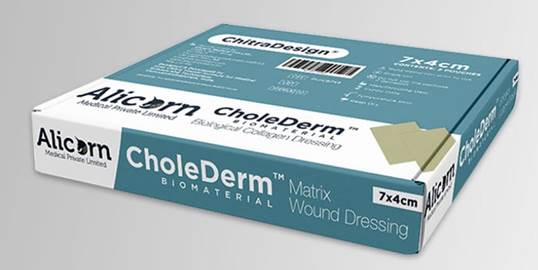The Indian Drugs Controller has granted approval to the first tissue engineering scaffold developed within the country using mammalian organs. This animal-derived Class D Biomedical Device is capable of promoting rapid and cost-effective healing of skin wounds with minimal scarring. This achievement establishes the Sree Chitra Tirunal Institute for Medical Sciences and Technology (SCTIMST) as the first institution in India to successfully develop Class D medical devices that meet all the necessary regulatory standards set by the Central Drugs Standard Control Organization, Government of India.
The concept of using animal-derived materials as advanced wound care products is not new. However, the lack of indigenous technology has hindered the production of high-quality products that comply with the requirements of the Drugs Controller General. Therefore, such products were imported making them expensive.
Indian Drugs Controller approves first indigenously developed animal-derived tissue engineering scaffold for healing skin wounds with minimum scarring
👉Read here: https://t.co/uj6wYfOo67 pic.twitter.com/lBePQfsD5D
— PIB India (@PIB_India) June 13, 2023
The Division of Experimental Pathology in the Biomedical Technology Wing of the institute has developed an innovative technology that enables the creation of tissue engineering scaffolds using mammalian organs. Investigations conducted in the division in the past 15 years under the leadership of Prof. T. V. Anilkumar decellularised pig gallbladder and recovered the extracellular matrix. Membrane forms of the scaffold, identified as Cholederm, healed different types of skin wounds including burn and diabetic wounds in rat, rabbit, or dog faster than similar products currently available in the market with minimal scarring as proved by several in-depth laboratory investigations focusing Type I and Type III collagen.
The research team has also made significant progress in understanding the underlying mechanisms of the healing process facilitated by the graft. They have discovered that the healing reaction is regulated by anti-inflammatory M2 macrophages, which have pro-regenerative properties. Additionally, the scaffold has shown the ability to modulate and mitigate scarring reactions in subcutaneous, skeletal muscle, and cardiac tissues.
In 2017, the technology was transferred to Alicorn Medical, a biopharmaceutical startup operating within the technology incubation facility of the institute, known as TIMed.
“Considering the stringency of the compliance requirements for Class D Medical Devices as per the 2017-Medical Device Rules of India and the general belief among stakeholders that development of animal-derived Class-D Medical Devices is not practical in India, this is a milestone achievement for the Institute, especially the research team as well as Alicorn Medical,” said Dr. Harikrishna Varma, the Head Biomedical Technology Wing of the institute.
The introduction of Cholederm into the Indian market is expected to significantly decrease the treatment cost from Rs 10,000/- to Rs 2,000/-, making it more affordable for the general public. Additionally, the technology for extracting extracellular matrix from the gallbladder is unique to the researchers, providing a competitive advantage in the international market. Furthermore, this research has transformed pig gallbladders, previously considered a waste product in slaughterhouses, into a valuable raw material for the biopharmaceutical industry. This creates an additional income source for pig farmers.
However, the application of membrane forms of the scaffold for cardiac injury treatment posed certain challenges. As a result, the team is currently working on developing injectable gel formulations of the scaffold. This will allow for convenient on-site delivery via transvenous injection and enable surface modifications of polymeric medical devices.
“Further investigations in multiple species of animals are necessary to confirm the claim. If true, these observations are likely to revolutionaries the contemporary modalities of managing patients suffering from myocardial infarction,” said Prof. T. V. Anilkumar.

